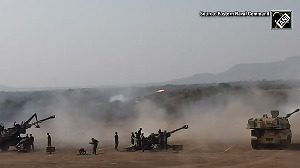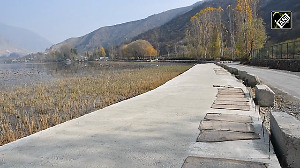The future of Nepal, the King and its 20 million people will oscillate between Kathmandu and Geneva this fortnight.
The troika of New Delhi, Washington and London seems to be holding the balance on the issue.
At the ongoing 61st session of the United Nations' Commission on Human Rights in Geneva, hectic parleys are on between governments, voluntary groups and activists the Himalayan kingdom's stable future.
India holds the key to peace in Nepal.
On February 1, Nepal's King Gyanendra dismissed the Sher Bahadur Deuba government, which was appointed last year, and assumed executive power.
Dismissing the government, the King said it failed to hold elections and make peace with the Maoists. The same reason was given after the dismissal of the Deuba government in 2002.
The country has been facing an armed insurgency since 1996 and is tottering on the brink of becoming a failed state.
Under constitutional monarchy, the king is not supposed to take over executive charge. Activists are alleging persecution of ordinary people, especially women, by both Maoists and the Royal Nepal army.
About 11,000 people have been killed due to the armed internal conflict in Nepal.
Addressing a meeting at the United Nations, Sushil Pyakurel, member of Nepal's National Human Rights Commission, said the situation was "very bad."
He accused the government of not allowing the NHRC, a statutory body, to work freely and investigate cases of violence.
He said, "My colleagues and I are denied access to the site to investigate. There is no body to look into our recommendations and suggestions. There is complete anarchy."
Activist Dr Renu Rajbhandari said women were detained and raped in military barracks but nobody was bothered.
So far, India has been playing safe. It has been watching the drama unfold and keeping its counsel.
It has stopped military supplies to Nepal and urged the release of political activists under detention.
Here at the United Nations, Nepal has been cornered from all sides. Switzerland, with the support of European Union, is trying to pass a resolution against Nepal under Agenda Item 9 at the United Nations; voting on which will happen in a fortnight.
If a resolution under Agenda Item 9 is passed against Nepal, UN will appoint a Special Rapporteur to the country to investigate human rights violations and suggest measures to be taken by the international community to bring greater accountability.
This process, which enforces intrusive international monitoring, is generally known as "naming and shaming of the country".
However, Switzerland and EU are willing to forego Item 9 if Nepal agrees to have a resolution ensuring international monitoring and the restoration of a multi-party democracy in a given time frame.
Negotiations are on in this respect.
UK and US are in consultation with India to make the king see reason and restore multi-party democracy in Nepal. Being an influential neighbor, India is the only country that can facilitate return to normalcy, effectively and constructively.
India's dilemma at the UN is that it wants action against Nepal but under "manageable parameters". It does not want any international monitoring in its neighborhood. It will oppose Item 9 against Nepal fearing the same may happen for Kashmir in the future.
Suhas Chakma, director of New Delhi-based Asian Centre for Human Rights says: "The greatest fear for India is that it cannot have a failed state in its neighbour. It is in India's interest that it intervenes in a constructive way."
According to sources, there are Ukrainian mercenaries piloting helicopters gifted by India in Nepal. There are mercenaries from South Africa's old apartheid regime as advisors in the Royal Nepal Army. All this will cause problems for India if Nepal becomes a failed state. There is an open border between India and Nepal.
What if a multi-party democracy is not restored to Nepal?
The lower ranks and grassroot workers of political parties -- both Congress and the Communists -- will move towards the Maoist insurgents.
They would believe Maoists are the only people capable of unseating the king and overthrowing the regime. This will have a long-term political consequence for India, which it will not like.
Ravi Nair, director of the South Asia Human Rights Documentation Centre, says: "If multi-party democracy does not return to Nepal, the king and the monarchy will fall in two years. The power of the king does not spring from the people of Nepal, but rests on his control of the Nepal Royal Army. The army is already weakened by the cutting off of international supplies, the king is concurrently affected "
"In the absence of a democratic, multi-party alternative, a Maoist takeover which the international community, including India, will not like is on the horizon. Governments at the UN recognise India's pivotal role in any resolution but are also worried that Delhi's timetable may not be in consonance with fast moving developments in Nepal."
Based in New Delhi, Nair's organisation published the first comprehensive report on the Maoist insurgency in 1998.
The problem for India is that overt intervention will assist the Maoists to convert the anti-monarchy campaign into an anti-India campaign.
So far efforts to bring the Maoists to the negotiation table have failed. But Arjun Karki of the NGO, Federation of Nepal, an association of 200 Nepali groups, said: "We know that the Maoists want UN intervention and they are willing to talk. India should take some steps now."
In the United Nations, pressure is mounting on Nepal. Meetings are being organised everyday to discuss the situation. The king's emissaries have been unsuccessfully countering arguments against the regime.
Nepal's Minister for Foreign Affairs Ramesh Nath Pandey said, while addressing a high-level meeting at the UN, "It was a difficult choice and a hard decision for the king. The state of emergency has been imposed only for three months to ensure peace and safety in Nepal and to fight terrorism (Maoists)."
Nepal cannot afford a resolution passed against it under Item 9 because 60 percent of the country's development budget depends on international donor aid.
Nepal is seen as trying to play a clever game. On one hand, it is attempting to play the China card. China will not like India's direct intervention in Nepal. However, it recognises that Nepal falls within the Indian sphere of influence.
On the other hand, Nepal is trying to appease India. It released Nepali Congress leader G P Koirala from political detention.
Welcoming the move, India has called for the release of other leaders, including Madhav Kumar Nepal of the Communist Party of Nepal (United Marxist -Leninist).
India thinks that coordination between Nepal's various politicians would be necessary to pacify the king. Which is why on Tuesday, an aide of the king accused Indian Ambassador to Nepal, Shiv Shankar Mukherjee, of instigating politicians against the monarchy.
The aide, Bharat Keshar Singh, demanded Mukherjee's expulsion from the kingdom. However, it was later dismissed as his personal comment.
As pressure mounts on Nepal at the United Nations and in South Asia, there are some changes expected in Kathmandu.
Will the king attempt a new interim government with those he detained earlier?






 © 2025
© 2025